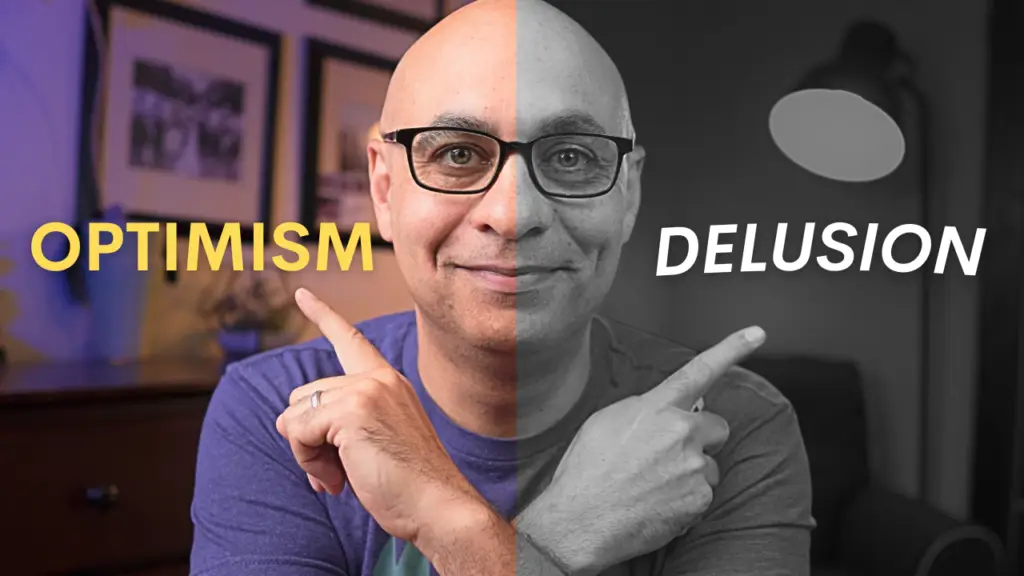Let’s be real for a second—are you an optimist, or are you just fooling yourself? We’ve all been there, right? One minute, you’re convinced the universe is going to hand you the perfect outcome, and the next… well, you’re stuck wondering how the heck you missed all those warning signs.
I’m not here to knock optimism—it’s basically my superpower. But I’ll admit, optimism can be a little dangerous if you don’t keep it in check. Trust me, I’ve learned that the hard way.
So let’s talk about it. Where’s the line between optimism and straight-up delusion? How do you stay hopeful without becoming blind to the realities around you? I don’t have all the answers (I mean, come on, I’m still figuring this stuff out too), but I’ve got some thoughts—and I want to hear yours too.
When Does Optimism Become Delusion?
Here’s the deal: Optimism is awesome—until it’s not. Don’t get me wrong, I’m all about seeing the bright side of things. Heck, optimism is what got me to quit my job, start a whole new journey, and, well, land here, writing this. But there’s a fine line between optimism and delusion, and it’s one we all need to keep an eye on.
You ever been in that situation where you just knew things would work out, but somehow, the universe didn’t get the memo? Yeah, same. There have been times I was convinced something was going to be a total win, and spoiler alert: it wasn’t. The problem wasn’t optimism, though—it was ignoring the signs that maybe, just maybe, I needed to tweak the plan.
So, When Does Optimism Help (and When Does It Backfire)?
Optimism is great for getting us through the tough stuff, but here’s the kicker: it doesn’t mean ignoring reality. It means acknowledging that things could go wrong but choosing to believe you’ll find a way through it.
On the flip side, delusion is when you’re sure everything will be perfect without actually preparing for what could go wrong. Think of it this way: optimism is packing an umbrella on a cloudy day, just in case. Delusion? That’s skipping the umbrella because you’re sure the clouds will magically disappear.
I’ll admit, I’ve been there more times than I care to admit. There was that time I decided to DIY my way through a massive project with zero backup plan, all while convincing myself I could do it in half the time. Spoiler: I couldn’t. But hey, I learned something, and that’s a win in my book.
Why Optimism Still Wins (Most of the Time)
Even though optimism can sometimes veer into delusional territory, here’s why I still believe it’s the way to go—when it’s grounded. Optimism isn’t about assuming everything will be easy. It’s about having the confidence to keep going when things get hard. It’s the belief that, no matter what curveballs life throws at you, you’re going to figure it out.
That’s what makes optimism so powerful. When you’re grounded in reality, optimism pushes you to take chances you wouldn’t take otherwise. It makes you resilient because you know that even if things don’t go perfectly, you’ll adapt.
So, Are You Fooling Yourself? Let’s Debate.
Now, I want to hear from you—where do you draw the line? Do you think optimism can actually get you into trouble, or does it always help in the long run? Have you ever gone too far with optimism and ended up in a mess? Or do you think a little delusion is actually necessary to take big risks?
Hit me up in the comments, and let’s talk about it. I genuinely want to know—what’s your take on optimism vs. delusion? Do you think I’m wrong, or do you agree that the line is sometimes hard to spot?
And hey, if you’re still on the fence about where optimism becomes delusion, check out my video below. I dive deeper into how I balance hope and reality, and trust me, it’s worth a watch—especially if you’ve ever convinced yourself everything was going to be perfect… only to get a reality check.

